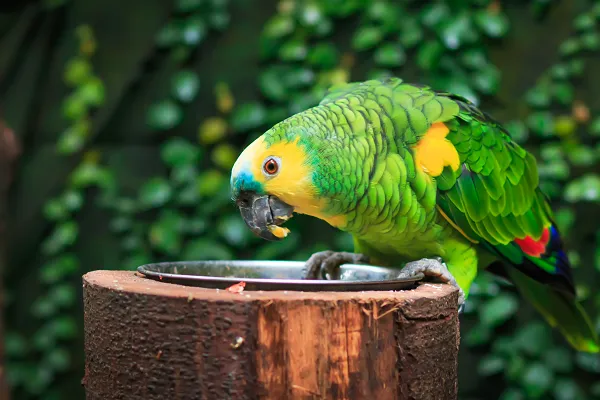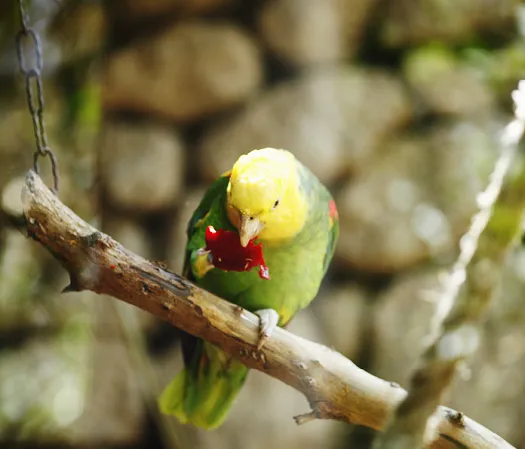Amazon parrots are vibrant, intelligent birds that thrive on a balanced Amazon parrot diet. As pet bird owners, ensuring proper nutrition is key to preventing common issues like obesity, vitamin A deficiencies, and calcium shortages. Our understanding of avian nutrition has advanced through research, highlighting the need for tailored diets based on species-specific requirements. Like all pets, Amazon parrots require carbohydrates, proteins, fats, vitamins, minerals, and water in the right proportions. Neglecting this can lead to serious health problems, so consulting an avian veterinarian is essential for personalized advice.
Bird nutrition is often overlooked, with many owners mistakenly believing seed mixes suffice. In reality, poor diets contribute to feather plucking, weakened immunity, and shortened lifespans. The goal isn’t mere survival but helping your Amazon parrot flourish with energy and vitality. Educate yourself on evidence-based recommendations from avian experts to optimize your bird’s Amazon parrot diet.
 An Amazon parrot happily eating seeds and fruits from a dish
An Amazon parrot happily eating seeds and fruits from a dish
Amazon Parrots’ Natural Diet in the Wild
In their native habitats, Amazon parrots forage for a diverse array of seeds, nuts, fruits, berries, and vegetation. They climb branches rather than fly between food sources, favoring seasonal plants. A standout favorite is the fruit of the African Oil Palm Tree, providing essential fats and nutrients. This varied intake naturally balances their nutritional needs, unlike monotonous captive diets.
Essential Components of a Balanced Amazon Parrot Diet
Amazons are prone to nutritional imbalances on seed-heavy diets, leading to obesity and deficiencies. A well-formulated Amazon parrot diet should prioritize pellets, fresh produce, and limited seeds to mimic wild variety while meeting modern veterinary standards.
Seeds: Limit to Prevent Health Risks
Seeds form only a minor part of a healthy Amazon parrot diet. Wild Amazons eat seasonal seeds, but commercial mixes are often fat-laden and low in vitamin A and calcium. Birds selectively pick high-fat options like sunflower seeds and peanuts, exacerbating malnutrition and weight gain.
Seeds should comprise no more than 10-20% of the diet, supplemented with occasional tree nuts like almonds or walnuts. Gradually reduce seeds by introducing alternatives; your bird will adapt with patience. Avian vets warn that all-seed diets can cause premature death.
Pelleted Diets: The Foundation for Optimal Health
Pelleted foods are nutritionally complete, designed by experts for different life stages and health needs. Available in various flavors, shapes, and sizes, they should make up 60-70% of your Amazon parrot’s daily intake, with the rest from fresh foods.
Hand-raised chicks should wean directly onto pellets. Transitioning seed-dependent birds requires time—start with 90% seeds and 10% pellets, increasing pellets by 10% daily over 2-6 weeks. Keep the dish quarter-full to encourage trying new foods. Monitor weight with a gram-scale digital tool and ensure normal droppings.
Consult an avian veterinarian experienced in behavior for stubborn cases. Persistence pays off: pellets support immune health, vibrant feathers, and longevity.
 Amazon parrot perched on a swing while enjoying its meal
Amazon parrot perched on a swing while enjoying its meal
Fruits, Vegetables, and Greens: Vital Daily Additions
Fresh produce should account for 30-40% of the Amazon parrot diet. Focus on vitamin A-rich options like carrots, sweet potatoes, bell peppers, squash, and leafy greens such as kale or romaine. Avoid watery, low-nutrient veggies like iceberg lettuce or celery.
Fruits (e.g., apples, berries, papaya) should not exceed 10% to prevent sugar overload. Never feed avocado, as it’s toxic to birds. Wash all items thoroughly, cut into bird-sized pieces (skins optional), and offer in a separate dish. Rotate varieties to ensure broad nutrient intake—if your Amazon fixates on one, limit it temporarily.
Clean Water: A Non-Negotiable Daily Essential
Provide fresh, clean water at all times. Use bottled water if tap quality is poor, and clean dishes daily with hot soapy water. Dehydration impacts digestion and overall health.
Sharing Human Foods Safely with Your Amazon Parrot
Small amounts of wholesome family foods are fine if they align with guidelines. Occasional lean cooked meat, fish, egg, or tiny cheese portions work for some birds, despite lactose intolerance limiting dairy.
Avoid entirely: Processed junk like fries or pizza, salty snacks, chocolate, caffeine, and alcohol. Common sense and vet input prevent accidental poisoning.
Adjusting Diet for Life Stages and Special Needs
Young, breeding, stressed, or injured Amazons may need tailored nutrition, such as calcium-boosted pellets for egg-laying females. Discuss with your vet for specialized formulas.
Supplements: Use Sparingly and Wisely
A pellet-based Amazon parrot diet with fresh foods rarely requires extras, as pellets are complete. Seed-eaters might benefit temporarily from powdered vitamins on moist foods (not water, to avoid bacterial growth). Eliminate once transitioned. Only supplement under veterinary guidance for conditions like egg-laying.
No Grit or Gravel Needed for Parrots
Unlike seed-swallowers like pigeons, Amazons husk seeds before eating, so grit is unnecessary and risky—over-ingestion causes blockages. Skip sandpaper perches too.
Key Feeding Tips for Amazon Parrot Owners
- Monitor daily intake and weight closely.
- Refresh water daily.
- Base diet on pellets (60-70%), fresh produce (up to 40%), minimal seeds.
- Persist with new foods—rejection today doesn’t mean forever.
- Clean dishes thoroughly daily.
Recommended Foods: Apples, cherries (pitted), pears, papaya, apricots, bok choy, peas, cantaloupe, asparagus, coconut, peppers, cabbage, banana, corn, pineapple, orange, cooked beans, cucumber, plum, sweet potato, chickpeas, dandelion greens, pomegranate, strawberry, peaches, blueberry, potato, nectarines, lentils, endive, pumpkin, Brussels sprouts, carrots (with tops), fig, rapini, broccoli, parsnip, grapes, raspberry, mango, zucchini, grapefruit, brown rice, squash, tomato, kale, romaine lettuce, sprouted seeds, beet greens, kiwi, spinach, melons.
In summary, a proper Amazon parrot diet centered on pellets, diverse produce, and limited seeds promotes longevity and joy. Partner with an avian veterinarian to fine-tune based on your bird’s needs, monitor progress, and address issues promptly. Your commitment to evidence-based nutrition will help your Amazon thrive—start today for a healthier tomorrow!
References:
- Association of Avian Veterinarians (AAV) guidelines on parrot nutrition.
- Research from the Journal of Avian Medicine and Surgery on seed vs. pellet diets.
- Consult local avian vets for species-specific advice.
